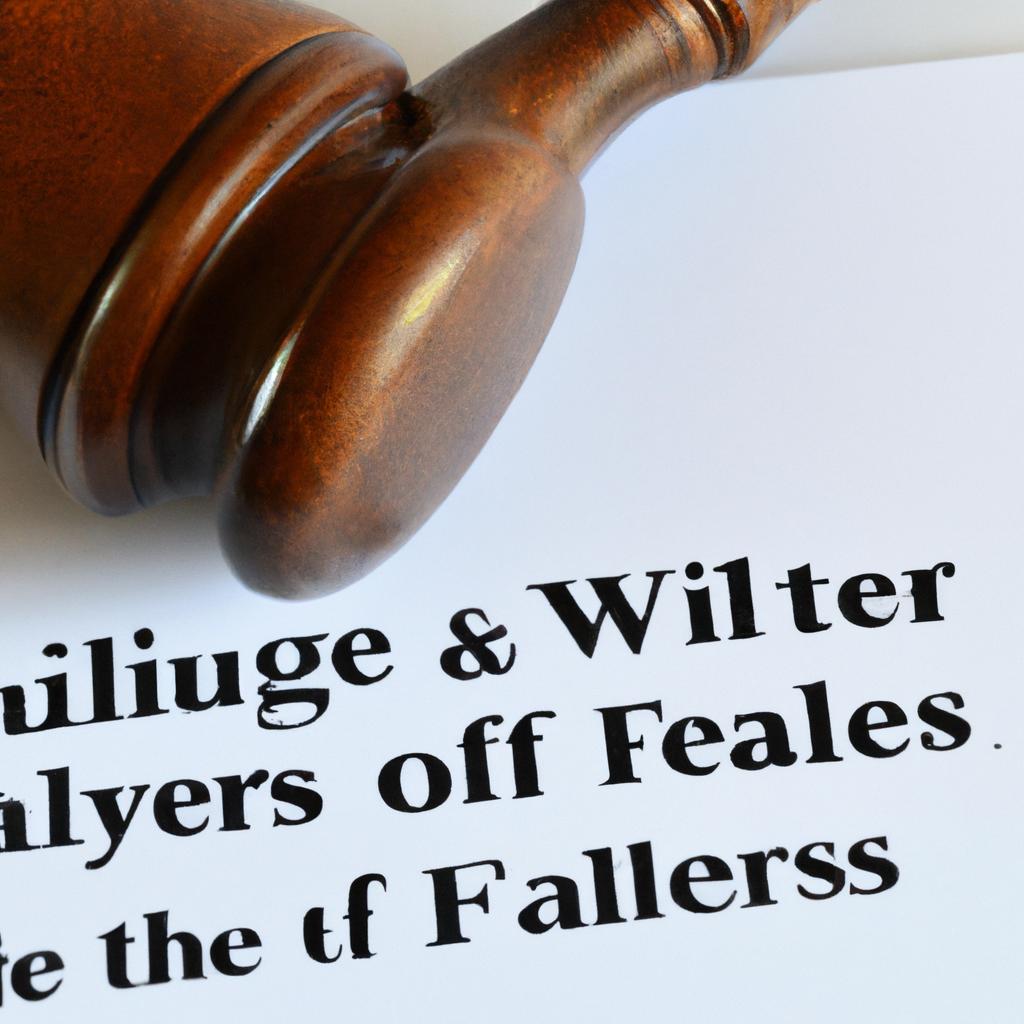In the intricate realm of estate planning, a particularly intriguing concept known as the “slayer rule wills” often sparks debate and contemplation. As seasoned legal practitioners at Morgan Legal Group in New York City, we specialize in navigating the complexities of Wills and trusts, including the intricate nuances of the slayer rule. Join us as we delve into the intricacies of this intriguing legal principle, shedding light on its implications and applications within the realm of estate administration.
Understanding the Implications of Slayer Rule Wills in Estate Planning
When it comes to estate planning, one important aspect to consider is the implications of slayer rule wills. The slayer rule, also known as the “slayer statute,” is a legal principle that prohibits a person who has unlawfully caused the death of another person from inheriting or benefiting from the deceased person’s estate. Understanding how the slayer rule applies in estate planning is crucial to ensure that the wishes of the deceased are carried out and that justice is served.
It is important to work with an experienced estate planning attorney to navigate the complexities of slayer rule wills. A knowledgeable attorney can help you understand how the slayer rule may impact your estate plan and provide guidance on how to protect your assets and ensure that your wishes are followed. By working with a professional like Morgan Legal Group in New York City, you can be confident that your estate plan is legally sound and that your loved ones are protected.

Challenges Faced When Dealing with Slayer Rule Wills in Probate Proceedings
When facing slayer rule wills in probate proceedings, there are several challenges that can arise, requiring careful navigation and expertise. One of the primary challenges is determining the legal implications of the slayer rule itself, which prohibits individuals who have unlawfully caused the death of a testator from inheriting under the will. This rule can complicate matters significantly, especially when there are multiple beneficiaries involved.
Additionally, another challenge is establishing the culpability of the individual implicated in the slayer rule, as this can involve complex legal proceedings and evidence gathering. It is essential to ensure that all parties involved are represented fairly and that the sanctity of the probate process is upheld. Moreover, navigating the emotional and ethical considerations that come with slayer rule wills can also pose challenges, requiring a delicate balance of legal expertise and compassionate guidance.

Key Considerations for Drafting and Executing a Slayer Rule Will in New York
When drafting and executing a slayer rule will in New York, there are several key considerations that must be taken into account to ensure the validity and enforceability of the document. The slayer rule, also known as the “slayer statute” or the “forfeiture rule,” prevents individuals who are responsible for the death of the decedent from inheriting or otherwise benefiting from the decedent’s estate. In order to effectively implement a slayer rule will, the following factors must be carefully considered:
- Evidence of wrongdoing: It is crucial to gather and document evidence that proves the individual named in the will as the beneficiary was responsible for the decedent’s death. This evidence may include police reports, witness statements, and forensic evidence.
- Disinheritance clause: The slayer rule will should contain a clear and specific disinheritance clause that explicitly states that the individual named as the beneficiary will forfeit their inheritance if they are found to be responsible for the decedent’s death.
- Court supervision: In some cases, it may be advisable to seek court supervision or approval when drafting and executing a slayer rule will to ensure that all legal requirements are met and to prevent any potential challenges to the document’s validity.

Ensuring Compliance with the Legal Requirements of Slayer Rule Wills in Trusts and Estate Law
In the intricate world of trust and estate law, the Slayer Rule Wills hold a significant place in determining who can inherit from an estate. This rule prevents individuals who have unlawfully caused the death of the decedent from benefitting from their estate. To ensure compliance with the legal requirements of Slayer Rule Wills, it is crucial to understand the intricacies of this rule and how it impacts the distribution of assets.
When dealing with Slayer Rule Wills, it is essential to consult with experienced legal professionals who specialize in trust and estate law. By working with knowledgeable attorneys, individuals can navigate the complexities of this rule and ensure that the estate is distributed in accordance with legal guidelines. Additionally, thorough documentation and detailed records are essential to demonstrate compliance with the Slayer Rule Wills and protect the integrity of the estate.
Q&A
Q: What is a “slayer rule will”?
A: A slayer rule will is a legal principle that prevents someone who has wrongfully caused the death of another person from benefiting financially from their victim’s estate.
Q: How does the slayer rule work?
A: The slayer rule typically voids any provisions in a will that would benefit the person who caused the deceased person’s death. This means that the killer cannot inherit any assets or property from the victim.
Q: What constitutes wrongful cause of death under the slayer rule?
A: Wrongful cause of death under the slayer rule can include murder, manslaughter, or any other criminal act that results in the death of the victim.
Q: Are there any exceptions to the slayer rule?
A: In some cases, there may be exceptions to the slayer rule, such as if the killer was found not guilty by reason of insanity or if the killing was deemed to be in self-defense.
Q: How is the slayer rule enforced?
A: The slayer rule is typically enforced by the court system, which will review the circumstances of the death and the relationship between the killer and the victim to determine if the rule applies.
Q: Why is the slayer rule important?
A: The slayer rule is important because it helps ensure that those who wrongfully cause the death of another person are not able to profit from their crime. It also helps protect the integrity of the deceased person’s wishes as expressed in their will.
Future Outlook
In conclusion, the slayer rule serves as a unique and important legal principle that ensures justice is served even in matters of inheritance. By preventing individuals who have committed wrongful acts from benefiting from their victims’ estates, this rule upholds the values of fairness and morality in the legal system. As society continues to evolve, the importance of the slayer rule in wills and estates cannot be understated. This rule stands as a powerful reminder that true justice can never be compromised, even in matters of life and death.
 Understanding Slayer Rule Wills: Everything You Need to Know
Understanding Slayer Rule Wills: Everything You Need to Know
When someone loses a loved one, the last thing they want to think about is the legal matters surrounding their inheritance. However, it’s important for both individuals and their heirs to be aware of estate planning laws, specifically the “slayer rule” when it comes to wills. This rule is designed to prevent murderers from benefiting from their heinous acts by inheriting from their victim’s estate. In this article, we’ll provide a comprehensive overview of Slayer Rule Wills, covering everything from the definition and history of this law to practical tips and case studies. So, let’s dive in!
What is the Slayer Rule?
The Slayer Rule, also known as the slayer statute or slayer law, is a legal principle that prevents a person who has unlawfully caused someone’s death from receiving any benefit from the victim’s estate. This means that if a beneficiary of a will is found guilty of murder, they are ineligible to receive any inheritance from the deceased. The rule is based on the principle that a person should not be allowed to profit from their own wrongdoing.
History of Slayer Rule Wills
The concept of the Slayer Rule stems from the ancient legal maxim “no man shall profit from his own wrong.” This idea has been present in various legal systems for centuries, with many countries adopting similar laws and statutes to protect the integrity of inheritance and ensure justice for victims. In the United States, the Slayer Rule was first recognized in 1806, in the case of Campbell v. Walker, where the court ruled that a murderer should not receive any portion of their victim’s estate.
Since then, all 50 states across the country have enacted some form of the Slayer Rule, with each state having its own specific provisions and guidelines. Some states also recognize the rule in cases of voluntary manslaughter or assisted suicide, while others only apply it in cases of intentional homicide.
How Does the Slayer Rule Work?
The Slayer Rule applies to both wills and trusts, and it can be triggered in two ways:
1. Murder Conviction: If the beneficiary of a will is found guilty of murder, the Slayer Rule automatically comes into effect, and they are barred from inheriting anything from the deceased’s estate.
2. Civil Action: In the absence of a murder conviction due to lack of evidence or other legal technicalities, the Slayer Rule can be invoked through a civil action. This means that the victim’s heirs or the executor of the estate can file a lawsuit to prove that the beneficiary unlawfully caused the death of the deceased. If the court finds sufficient evidence to prove the beneficiary’s guilt, they will be barred from inheriting anything under the terms of the will.
Exceptions to the Rule
While the Slayer Rule is a widely accepted legal principle, there are some exceptions and nuances that are important to understand. Some of the common exceptions to this law include:
1. Insanity: In some states, if the accused killer is deemed legally insane, they may still be entitled to inherit from the victim’s estate since they did not technically commit the act of murder with criminal intent.
2. Lack of Capacity: If the accused killer lacked the mental capacity to understand their actions, they may be exempt from the Slayer Rule.
3. Life Insurance: In cases where a victim’s life insurance policy names the killer as a beneficiary, the Slayer Rule may not apply, as life insurance laws and regulations are different from those of wills and trusts.
4. Self-Defense: If the accused killer can prove that the victim died as a result of self-defense or defending others, the Slayer Rule may not apply.
Benefits and Practical Tips for Creating a Slayer Rule Will
Creating a Slayer Rule Will is an essential part of estate planning, and it can have several benefits for both the testator (person creating the will) and their heirs. Some of these include:
– Ensuring that one’s estate does not end up in the wrong hands and goes to deserving heirs
– Protecting innocent beneficiaries from being disinherited by the actions of one individual
– Avoiding lengthy and costly legal battles between heirs if a beneficiary is found guilty of murder
If you’re planning to create a Slayer Rule Will, here are some practical tips to keep in mind:
1. Be Specific: Clearly state in your will that the Slayer Rule applies to any guilty beneficiary and that their inheritance rights will be revoked if they are convicted in a court of law.
2. Appoint a Trustee: Consider appointing a trustee, who will oversee the distribution of your estate and ensure that the Slayer Rule is carried out effectively.
3. Regular Updates: It’s crucial to update your will regularly, especially if there are changes in relationships or family circumstances, to ensure that the Slayer Rule still applies to the right individuals.
Case Studies of Slayer Rule Wills
There have been several notable cases in which the Slayer Rule was invoked, with some of the most infamous being:
– O.J. Simpson: In 1995, following the infamous murder trial of O.J. Simpson, a civil court found him liable for the wrongful death of his ex-wife, Nicole Brown Simpson, and her friend, Ron Goldman. This verdict meant that he was barred from inheriting any portion of Nicole’s estate.
– Phil Garrido: In 2009, Jaycee Dugard, who was kidnapped and held captive for 18 years, was finally freed from her captors, Phillip and Nancy Garrido. Jaycee’s biological father passed away during this time, and his will specified that his daughter would receive $ 1,000 upon his death. However, due to the Slayer Rule, Phil Garrido was deemed ineligible to receive the inheritance.
– Ted Bundy: In 1978, Florida enacted the “Ted Bundy” law, which barred individuals convicted of murder from receiving the victim’s estate. This law was enacted specifically in response to the notorious serial killer who was found guilty of murdering two Florida State University students.
In Conclusion
While it may seem morbid to plan for the possibility of a beneficiary being involved in a murder, creating a Slayer Rule Will is a crucial step in ensuring that your estate is distributed according to your wishes. Understanding the Slayer Rule and its implications can help individuals make informed decisions when it comes to estate planning. If you’re considering creating a will, it’s always advisable to consult with an experienced attorney who can advise you on the best course of action.

